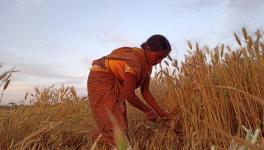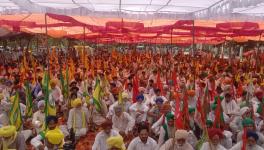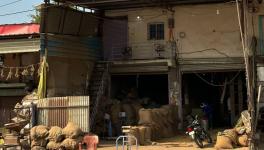UP Elections: Why a BJP Voter is Having a Change of Heart
Saharanpur: Ask Virender Singh of Kakrala village, Saharanpur, about the Yogi Adityanath-led Bharatiya Janata Party (BJP) government and pat comes the reply: “I am happy about the nearby new four-lane road. I hope to fly from one of the new airports about which I have heard so much.”
The farmer firmly believes that the state government “will do more for the less prosperous”—like him—when it has “more money”. However, an extra minute spent with him in his gher, a warehouse-like structure where farming implements, fodder and buffaloes are kept, opens the floodgates of complaints against BJP.
Singh, who sows wheat, sugarcane and some green fodder for his cattle on his 10 bighas, belongs to the Saini social group, a socially and economically backward community whose members are considered loyal BJP supporters.
Singh is proud of his three sons, who are in their 20s or 30s, and his several grandchildren are his source of joy. But he regrets that none of his sons could bag government jobs despite somehow managing to complete graduation on his small income. Their unemployment has made life difficult and the state government’s meagre financial support does not suffice for the needs of his big clan.
“Whenever my sons came close to getting jobs after filling several forms and waiting for years, they were asked to pay bribes. Obviously, we couldn’t afford it,” Singh, who relies on intermittent government relief, tells NewsClick. He has received a couple of instalments of Rs 2,000 each under the Pradhan Mantri Kisan Samman Nidhi. He also depends on the Rs 500 monthly pension though he has received only four instalments so far.
Singh never got the “free LPG cylinder” promised under Pradhan Mantri Ujjwala Yojana for he already had a cooking gas connection. He has to cough up Rs 930 for a monthly refill whenever required though his family prefers the chulha. “Mehengai zyada badha di inhoney (The government has allowed prices to soar),” he says.
Cooking oil costs Rs 190 a litre and petrol and diesel prices are sky-high as well. Though the family does not own a tractor, using their only motorcycle pinches Singh.
The government ration and 8-12 hour electricity supply haven’t helped either—they hardly need food grains and the newly installed electric meter is a source of anxiety. Hawk-eyed family members gaze at the whirring meter while frantically turning off lights and fans as they move from one room to another. “Still the monthly electricity bill amounts to Rs 1,000-1,100 plus the fixed Rs 2,000 I pay for pumping water into the fields. It is too expensive for farmers like us and the state government must reduce the high electricity tariffs,” he says.
Virender is not the smallest of farmers one would encounter in this region but his woes are sizeable—the reason is the dwindling income from farming and the vagaries of the system he is dependent on. One of his family’s biggest problems is the lack of government jobs, meaning no reliable source of cash income.
A government job, especially in the police or the Army, is also a source of pride for the middle castes. Their yearning for a better life is linked with such jobs a dream the government has failed to fulfil. “Look at my strapping young son,” says Singh pointing to 35-year-old Amit. “He should have been an SHO [station house officer] or a CO [circle officer] but is sitting at home,” he rues referring to ranks in the police.
Amit has a part-time “private job” but it demands long working hours, pays low and offers no satisfaction of a post-retirement benefit. Besides, private sector jobs don’t appeal to the educated landed classes.
The BJP made incredible promises to such families with TV and online advertising selling dreams of a lavish lifestyle. However, “politics did nothing in the last five years” to bring people like this family closer to achieving these dreams. No doubt, the news of rising GST (goods and services tax) collections triggers conflict within them for it clashes with the notion that the government “has no money”.
Singh’s nephew Deepak Saini, in his early 20s, is already cynical since the grim reality has dashed his dreams. “There are too many youngsters like me seeking jobs—when we fill application forms we realise that 15 lakh applicants are lined up for only 1,000 jobs,” he says questioning why there are so few government vacancies when every department, from healthcare to veterinary care and education to the police, is understaffed.
Deepak graduated in 2020 when COVID-19 hit India and the lockdowns followed. He still cannot travel far from his village since there is constant talk about “another lockdown” due to the third wave of the pandemic. Despite applying for a police job, he’s reconciled to any position as long as it is in the government.
“He’s unemployed. He will take what he gets. He is willing to be a safai karamchari (sanitation worker) or chaprasi (peon) —he’ll do anything. Does he have any choice? But it should be a government job because the private sector is extremely exploitative,” says his uncle Vinod Saini. “I cannot even be a private school teacher. They earn only Rs 3,500-4,000, which I will spend only on commuting,” says a dejected Deepak.
The lack of government jobs isn’t the only problem. Farming, the core livelihood of the Sani family, is not rewarding anymore. There is no mandi (market) in the area. “The governments of Punjab and Haryana have set up mandis for farmers but we have none. We are unable to sell our produce at the MSP and always end up with less,” says Vinod.
Singh is also upset about how things have turned out for farmers when it comes to cattle protection. “A male calf is of no use to us. When we take it to the gaushala (cow shelter), which is far off in Nakur, we are asked to fork out Rs 1,500-Rs 2,100,” he says. Shaking his head in despair, Amit explains the problem. If farmers don’t give up surplus cattle to the gaushala, they stray into agricultural fields and ruin crops. If 10 bulls and cows enter a 10 bigha field, they can munch half of the crops and trample the rest in a single night. The Saini family sustained such losses a couple of times.
The cattle crisis arose after BJP came to power at the Centre and the state and Hindutva outfits coerced Hindu farmers into protecting bovines from slaughter at any cost. The state government assured them that gaushalas would be set up to protect the males and dry females till their death. However, there are too few gaushalas and they are perennially short of cash. Therefore, they demand money from farmers who want to surrender unwanted cattle.
“We pay gaushalas to keep our animals there and don’t even know what happens to them. Who knows, the gaushalas might be letting them loose to re-enter our fields, forcing us to return them and pay again,” says a sceptic Singh. “Burey phans gaye (We’re badly stuck).”
Earlier, cattle traders would purchase unwanted bovines and buffaloes from farmers for a tidy sum. Many Hindu farmers have always regarded cows as holy but were never forced to not sell them to traders. It was a social contract in which both the farmer and trader benefited. Now, both sides are at a loss.
On top of these problems, Singh is burdened with debt. Every year, he withdraws Rs 2 lakh using his Kisan Credit Card and sometimes more from other sources. Penalties keep adding up because he can never repay on time. “We never have enough money to repay the loan within a year. We borrow Rs 2 lakh but end up repaying Rs 4 lakh,” says Amit. “We urgently need a loan waiver scheme but there is no sign of one.”
Singh’s debts keep piling up because the sugar mill delays paying for his produce. “Sometimes, we wait for six months to get paid. In case of an emergency or a wedding, we don’t have an option but to borrow. The mills don’t pay us interest when payment is delayed but we repay loans with interest,” he says.
Singh recollects how BJP had promised to clear sugarcane arrears within two weeks if it came to power. The mills owe him around Rs 50,000. “Sardi me 1-1.5 lakh ka ganna doonga, chaumase me paisa aayega (I will deliver sugarcane worth Rs 1-Rs 1.5 lakh during the winter and the payment will only arrive during the monsoon.)” The vicious cycle of repaying loans with income and borrowing again to meet expenses ensures that farmers like Singh never have cash.
Singh’s anxieties could move anyone to tears—the urea needed for his crops is in short supply and more expensive. Unlike in the past, he sometimes waits for 10 days at a stretch to get urea. Often, the time for fertilising crops is over and he is forced to use cheaper available substitutes that are less effective.
Ask him again and Singh says his biggest worries are the high electricity tariffs and the burden of excessive loans and interest. This is not the “price of development”, an argument often cited by wealthy farmers, he says. Due to these two primary worries, he considers himself a “bandhak (prisoner)” of the system.
The BJP had promised the moon to its voters. However, five years into its term, the Adityanath government is relying on religious polarisation to win this election. Indeed, Singh had bought into the propaganda that Uttar Pradesh is less crime-prone than before, but he plans to vote for one of BJP’s rivals on February 14.
The Samajwadi Party has fielded Dharam Singh Saini, who recently resigned from Adityanath’s cabinet, and sections of his community have pinned their hopes on him instead of his former party. When long-term loyalists start picking a candidate they like instead of the party they support, a surprise could be in store.
Get the latest reports & analysis with people's perspective on Protests, movements & deep analytical videos, discussions of the current affairs in your Telegram app. Subscribe to NewsClick's Telegram channel & get Real-Time updates on stories, as they get published on our website.
























